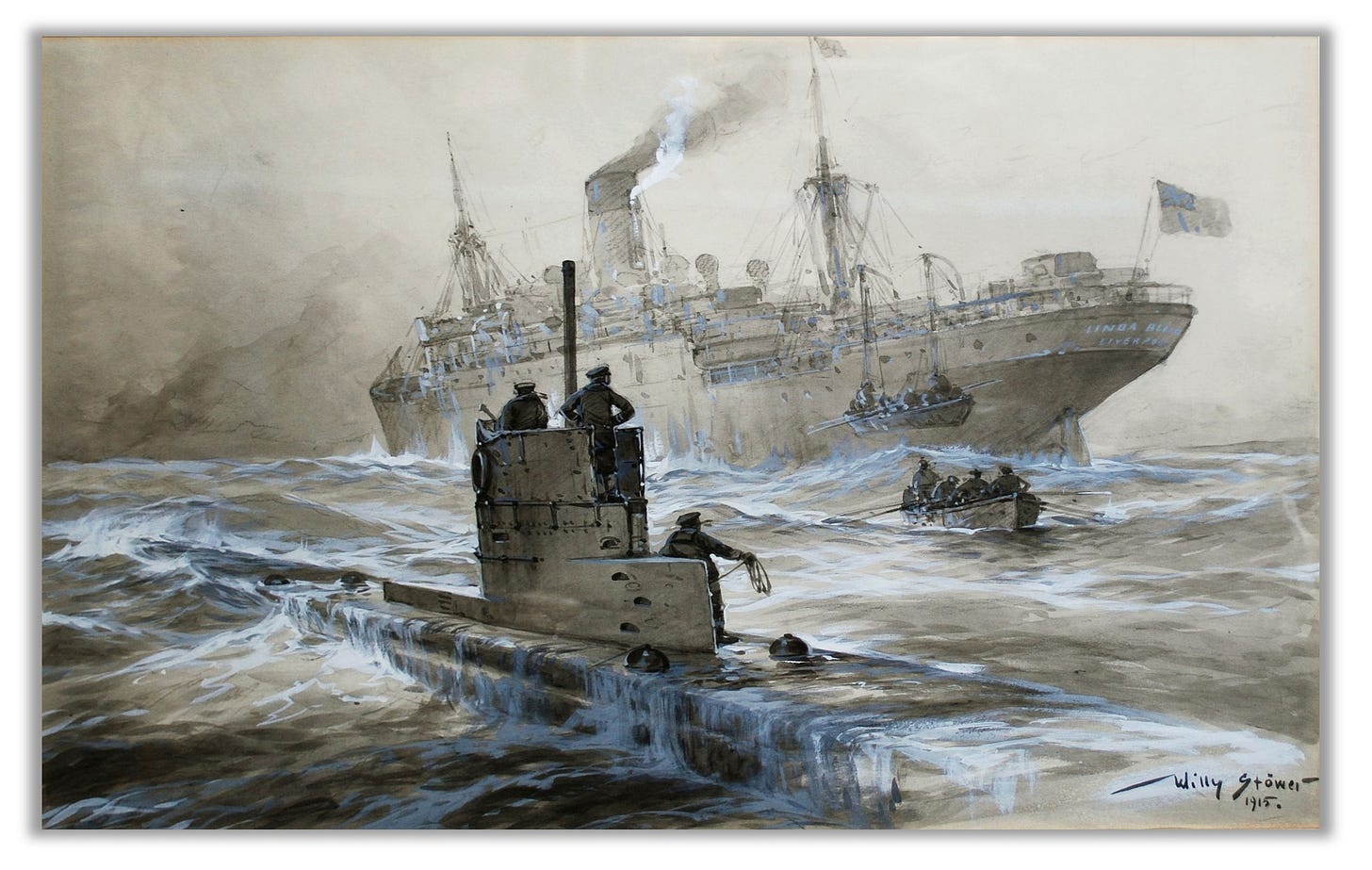TDIH: SS Gulfamerica Targeted
Do you know about the many American vessels that were torpedoed off the coast of the United States early in World War II?
On this day in 1942, SS Gulfamerica slowly sinks off the coast of Florida. She’d just been torpedoed by a German U-boat. She sank slowly and did not hit her final resting spot on the ocean floor until April 16.
Do you know about the many American vessels that were torpedoed off the coast of the United States early in World War II?
News of these disasters didn’t travel very far or very fast: The ships mostly went down in out-of-the-way locations, with few witnesses. The Navy also censored much of this news: Too much publicity might help the enemy.
Gulfamerica got more attention than most because her demise was so public.
The tanker was then making her maiden voyage, carrying oil from Texas to New York. Late on April 10, she was traveling past Jacksonville, Florida. That city was brightly lit because no one thought blackouts were necessary.
“It was a normal Friday night,” historian Scott Grant describes. “Both Ferris wheels were operating, the roller coaster was working, and people were in the bingo parlors, bars and movie theaters. The Jacksonville Volunteer Fire Company was having its inaugural firemen’s ball on the pier. It was just a normal Friday night in Jacksonville Beach.”
Gulfamerica was then four miles offshore.
“There was no blackout,” the German commander of U-123, Reinhard Hardegen, later said. “I could see the [Ferris wheel] in the amusement park and all the lights and motorcars and the hotel in full light.” Hardegen thought it “very easy” to see the ship’s silhouette against the lights.
At 10:20 p.m., he fired. A torpedo slammed into Gulfamerica, with the crowds in Jacksonville bearing full witness.
“The western sky suddenly erupted in a blinding red-and-yellow explosion,” one of the German officers later described his view to Michael Gannon. Gannon was then a teenager living in Jacksonville, but he would go on to investigate and write about these events.
The terror on shore must have been palpable. “There had been accounts of sinkings in the paper,” Gannon concludes, “but mostly they were ‘brave survival’ stories—men against the odds. But this was something everybody had seen. . . . this had happened practically on the beach. You couldn’t miss it. . . . It was a tremendous shock and very, very threatening. Nobody felt safe any longer.”
They couldn’t know that they had little to fear, at least not from Hardegen. The German commander was working to protect civilians as he took his next steps.
U-123 was then in deeper waters, facing both the shoreline and Gulfamerica. If Hardegen fired from that vantage point, any missed shots would hit the shore. He didn’t want that, so he deliberately moved his submarine, taking a risk by moving to shallow waters. His move brought U-123 between Gulfamerica and the shoreline. His new position allowed him to continue firing at Gulfamerica, but now any missed shots would simply head harmlessly out to sea.
It was a moment of humanity in the midst of war.
Nevertheless, Hardegen was soon firing on Gulfamerica again, this time with his deck gun. He stopped only when he knew Gulfamerica was too damaged to continue. Once he felt he’d delivered sufficient damage, he left. His goal had been to stop the transportation of oil, not to further hurt the survivors in the water.
There’s a postscript to the story, of course. Decades later, Gannon would track Hardegen down and interview him about these events. The collaboration helped Gannon complete his research. Hardegen soon visited Jacksonville, this time as an honored guest, in 1990.
“The town was very friendly to me,” he concluded.
Sources can always be found on my website, here.





Hi, everyone -- A few of you noted the discrepancy with Gannon looking to the "western sky," which is a good catch. I didn't notice that at first. I've since investigated and figured it out..... I obtained several of these quotes from the newspapers and book reviews that were published when Gannon's book was released. In one of them, I thought they meant that this was Gannon's view of the explosion. I dug further and now I see that he was describing what one of the German officers told him later. The German sub hadn't moved to shallow waters yet, so the Germans would have been looking west. I've fixed that paragraph. My apologies for the mistake!
Thank you Tara. This is the first that I have heard of the sinking of the SS Gulfamerica. I didn't even hear about the "reunion" of the U boat Commander in Jacksonville in 1990, until now.
I find that your slant on this story to be a welcome one because you could have easily overlooked the humanity of the situation. U boat Commander Hardegens actions on that night in 1942 proves that war is evil and ugly, not necessarily its participants. Also, I wasn't aware that there were so many sinkings so close to our shores. It's almost a stretch to say that we weren't attacked on our homeland during WW2.